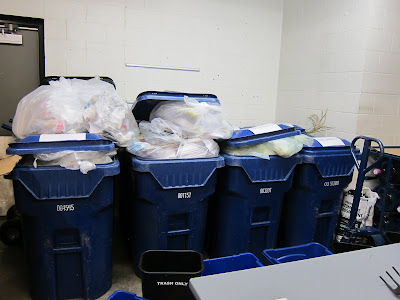
Today I went to a recycling-markets forum sponsored by the Recycling Association of Minnesota (RAM). All the markets have seen a dramatic comeback from 3 years ago. Metals, paper, plastics and glass are all commanding good prices.
Metals:
Matt Woessner of Kirschbaum & Krupp Metal Recycling in Minneapolis said base metal prices (e.g., lead, tin, nickel, copper, zinc) are all recovering from the 2008 slump. People who have been storing their metals in their basements and garages for the past 5-8 years and now bringing them in to sell.
China is leading the world in demand for base metals, especially copper.
85,000 pounds of Christmas lights and extension cords were recycled this past season.
Fibers (paper):
Liberty Paper in Becker, Minn., is a linerboard mill. Linerboard is the top sheet of a food box where the printing is visible to the consumer. Liberty makes linerboard out of 100% recycled paper.
Peg Wander, who presented for LDI Fibres (owner of Liberty Paper), said paper is global: hiccups in the supply and demand chain can affect U.S. markets. For example, Chinese New Year affects Minnesota markets. The paper industry must be collaborative, she said.
Electronics:
Marshall Johnson of Asset Recovery in St. Paul said that when new tech gadgets come out, Asset starts thinking about how they'll recycle those gadgets in two years.
How can consumers choose 'green' electronics? Look for EPEAT, international standards for electronics. EPEAT evaluates electronic products in relation to 51 environmental criteria.
Glass:
Strategic Materials is opening a plant in St. Paul by the end of the year. Jennifer Grace said it'll feature the latest technology -- ceramic detectors, color sorters, fine-grind cullet. Strategic processes plate glass, windshield and post-consumer container glass, recycling 2,000,000 tons per year in more than 30 locations.
Glass is made into new glass containers, fiberglass, reflective beads for highways, abrasives, tiles and decorative landscaping.
1 ton of recycled glass saves 1.1 tons of sand, soda ash and limestone, not to mention all the air emissions savings from not extracting those materials.
The life of glass is virtually unlimited.
With single-sort recycling, the glass processors are finding
- the 3-mix (green, brown and clear) is harder to process
- pieces of glass are smaller because there's more breakage
- processing costs are higher
- the glass is dirtier
- contamination is a big issue. Ceramics, metal, abrasives, Pyrex and glass ceramics all melt at different temperatures, causing weakness in the glass.
Recycling in general:
Jim Wollschlager from Randy's Environmental Services says they have 125 CNG-fueled trucks. CNG (compressed natural gas) is cheaper than diesel, quiet, with no emissions.
Randy's collected 20,000 tons of source-separated organics (SSO) in 2010. Jim gave the example of March 3, when one commercial route collected 10.7 tons of SSO.
With SSO collection, rates for traditional recyclables go up, too, as people become more mindful about recycling.
With commercial recycling, owners have to be involved, he said. You have to walk them through the process and get them on board. Perform a waste audit so they can see how much is being thrown away and how much of that could be captured for recycling.
Plastics:
Terry Nichols of Trident Polymers in Plymouth said the company is the busiest it's ever been. The company deals with 45-50 different physical material types. For example, even with a #1, or PET, plastic soda bottle, there are additives: glue, the paper label, the polypropylene (#5) cap.
If a plastic contains additives, Terry goes on a tracking mission, working back to the manufacturer of that particular product to find out what's in it.
And here's a tidbit: Even though PVC (polyvinyl chloride) has negative health and environmental impacts, he said it is mechanically stable and you can do the same things with it that you can do with glass.




























